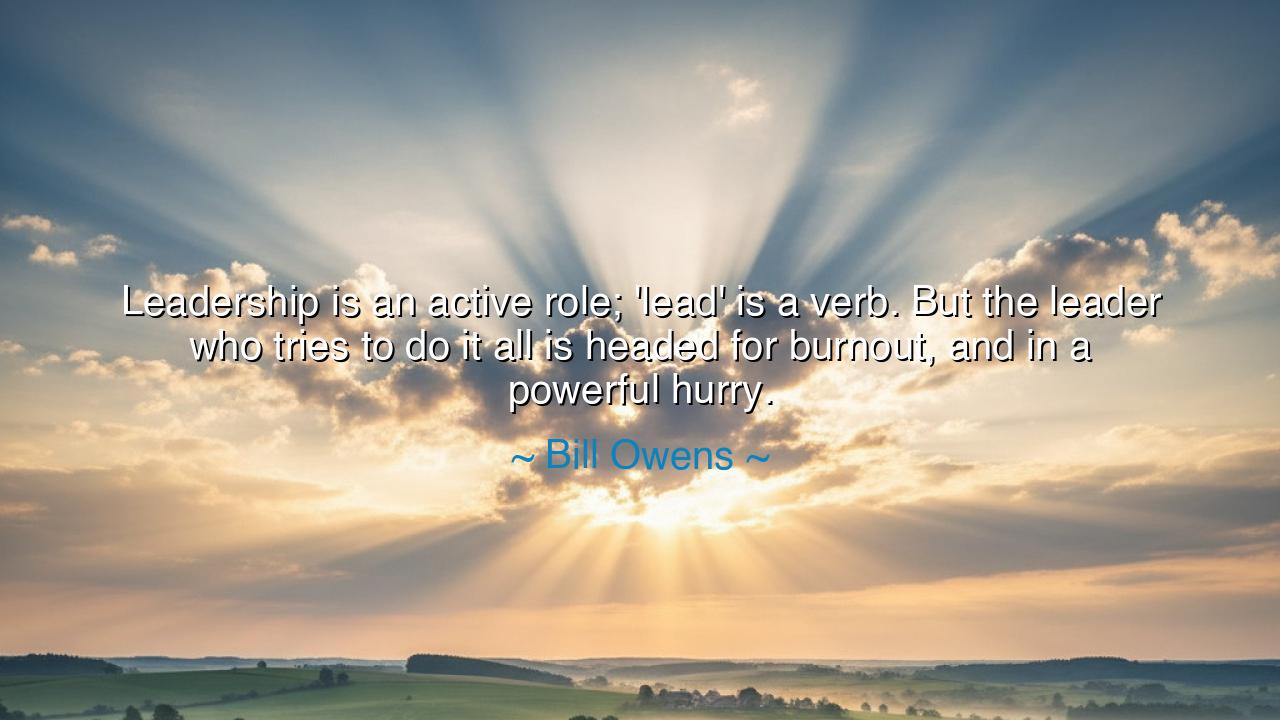
Leadership is an active role; 'lead' is a verb. But the leader
Leadership is an active role; 'lead' is a verb. But the leader who tries to do it all is headed for burnout, and in a powerful hurry.






The statesman Bill Owens once declared: “Leadership is an active role; ‘lead’ is a verb. But the leader who tries to do it all is headed for burnout, and in a powerful hurry.” In these words, he reveals the double-edged nature of guiding others. On one side lies the call to act, to move, to take responsibility—for to lead is not to sit idle but to step forward into struggle. Yet on the other side lies the danger: the leader who confuses action with omnipotence, who believes he alone must bear every burden, will soon collapse under the weight of his own striving.
The wisdom here begins with the truth that leadership is not a title but a verb. A crown on the head, a badge on the chest, or an office bestowed by vote—these are mere symbols. True leadership is lived in the act of guiding, of deciding, of moving people from where they are to where they must be. To “lead” is to do, not merely to be. It is the motion of courage, the embodiment of responsibility, the fire that lights the path forward.
But Owens warns of the peril that shadows this calling. The leader who believes that to “lead” means to “do everything” is deceived. Such a one will run swiftly into burnout, a fire that consumes without replenishing. For no man or woman, however great, can carry alone the labor of many. To attempt it is to hasten one’s own downfall. Here the lesson is ancient: even heroes must share their burdens, for greatness is not solitary but communal.
Consider the story of Moses in the wilderness. He sat from morning until night, judging the disputes of all the people of Israel. His father-in-law Jethro looked upon him and said, “What you are doing is not good. You will wear yourself out, and the people with you.” So Moses appointed wise men to share the work, to judge the smaller matters, while he led in the greater. Thus Moses escaped burnout, and the nation endured. Owens’s words echo this same timeless counsel: a leader must not do all, but must build others who can share the labor.
History offers another witness: George Washington, who commanded the Continental Army. He did not fight alone, nor attempt to oversee every detail. Instead, he built a circle of generals—Knox, Greene, Lafayette—and trusted them to lead in their spheres. By empowering others, he preserved his own strength for the battles that only he could fight. In this way, he avoided the ruin of overreach and brought forth victory for a fledgling nation.
The meaning for us is clear: to lead is to act, but to act wisely, knowing what is ours to do and what must be entrusted to others. The measure of a great leader is not in how much he personally accomplishes, but in how much he enables his people to accomplish together. To cling to every task is to shrink the greatness of the whole; to share responsibility is to magnify it.
The lesson for our own lives is urgent. Whether in the family, the workplace, or the community, do not confuse leadership with domination. To lead is to guide, to inspire, to create order and vision. Share tasks, train others, empower those around you. Guard your own strength, for exhaustion serves no one. The wise leader is like the sun: not burning himself out in a single blaze, but shining steadily, while giving light enough for others to act in their own strength.
Thus, Bill Owens’s words stand as a beacon: “Leadership is a verb… but the leader who tries to do it all is headed for burnout.” Let them be remembered by all who would guide others. Step forward, yes—be active, be courageous, take the first step. But also be humble enough to share the journey, for no path worth walking is walked alone. And in this balance lies the endurance of true leadership.






AAdministratorAdministrator
Welcome, honored guests. Please leave a comment, we will respond soon